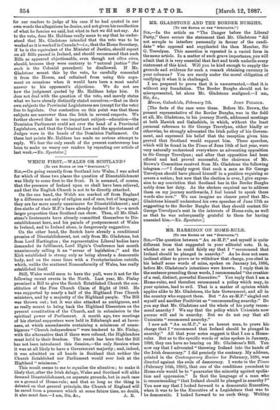MR. GLADSTONE AND THE BORDER BURGHS.
[To mos Emma or TIM Ersorkros."] SII1,—In the article on "The Danger before the Liberal Party," there occurs the statement that Mr. Gladstone "did? not scruple to interfere personally in favour of the candi- date" who opposed and supplanted the then Member, Sir G. Trevelyan. This assertion is repeated in a varied form in the same article. In a matter of such grave importance, you will admit that it is very essential that fact and truth underlie every statement of this kind. Will you be kind enough to supply the• grounds and evidence for such a remark obtaining currency in your columns P You are surely under the moral obligation of verifying it when it is challenged.
I am prepared to prove that it is unwarranted,—that it is without any foundation. The Border Burghs should not be- misrepresented, let alone Mr. Gladstone maligned.—I am, Sir, &c., Manse, Galashiels, February 7th. Joan Pottoox.
[The facts of the case were these. Before Mr. Brown, the present representative of the Border Burghs, was in the field at all, Mr. Gladstone, in his journey North, addressed meetings at both Hawick and Galashiels, in which, without the least personal reference to Sir George Trevelyan, either kindly or otherwise, he strongly advocated the Irish policy of his Govern- ment, and expressed his belief that the reception given him proved that Scotland would support him. These speeches, which will be found in the Times of Jane 18th of last year, were very naturally understood everywhere as advocating opposition to Sir George Trevelyan ; and after that opposition had been offered and had proved successful, the chairman of Mr. Brown's Committee received from Mr. Gladstone the following telegram :—" I deeply regret that such a man as Sir George- Trevelyan should have placed himself in a position requiring so severe a notice ; but now that the election is over, I give expres- sion to my conviction that Scotland has in the Border Burghs nobly done her duty. As the electors required me to address them on my journey northwards, I feel bound to speak these words also now." We can imagine no clearer proof that Mr. Gladstone himself understood his own speeches of June 17th as suggesting to the Border Burghs that they should contest Sir George Trevelyan's seat in the interests of Home-rule, as well as that be was subsequently grateful to them for having unseated him.—En. Spectator.]


































 Previous page
Previous page